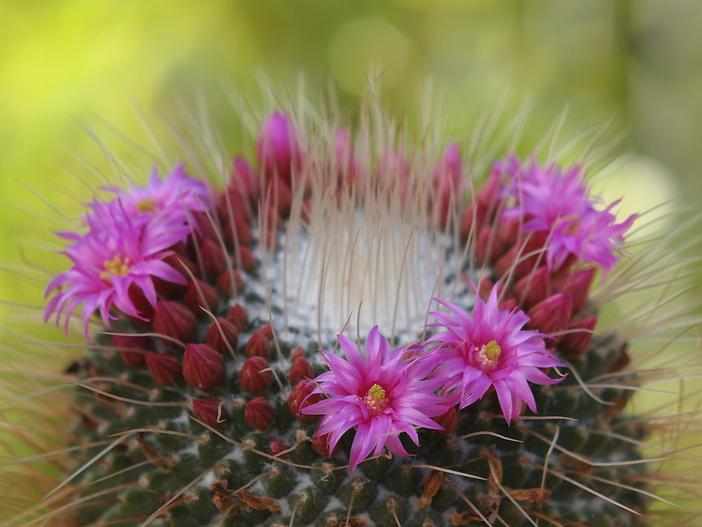Twin-Spine Cactus
(Mammillaria geminispina)
Twin-Spine Cactus (Mammillaria geminispina)
/
/

Dornenwolf
CC BY 2.0
Image By:
Dornenwolf
Recorded By:
Copyright:
CC BY 2.0
Copyright Notice:
Photo by: Dornenwolf | License Type: CC BY 2.0 | License URL: https://creativecommons.org/licenses/by/2.0/ | Uploader: Dornenwolf | Publisher: Flickr



























Estimated Native Range
Summary
Mammillaria geminispina, commonly known as Twin-Spine Cactus, is an evergreen succulent native to the arid regions of Eastern Mexico, where it thrives in rocky and open areas. This cactus reaches up to 25 cm (10 in) in height and 50 cm (20 in) in width. The plant’s appearance is characterized by clustering spherical stems, each about 8 cm in diameter, that are densely covered with white down and white spines, giving it a distinctive woolly look. During the summer and autumn months, it produces carmine pink flowers that add a splash of color to its spiky form. The flowers are moderately showy, attracting attention with their contrast against the white spines.
The Twin-Spine Cactus is valued for its unique texture and the carmine pink flowers that bloom under the right conditions. It is often grown as a potted plant in temperate regions, requiring a greenhouse or indoor setting with heat to mimic its native warm environment. It has earned the Royal Horticultural Society’s Award of Garden Merit, indicating its excellence for garden use. For successful cultivation, it requires full sun exposure, minimal watering to replicate its natural dry habitat, and well-draining soil to prevent root rot. It is relatively low-maintenance, making it a popular choice for cactus enthusiasts and those looking for drought-tolerant plants.CC BY-SA 4.0
The Twin-Spine Cactus is valued for its unique texture and the carmine pink flowers that bloom under the right conditions. It is often grown as a potted plant in temperate regions, requiring a greenhouse or indoor setting with heat to mimic its native warm environment. It has earned the Royal Horticultural Society’s Award of Garden Merit, indicating its excellence for garden use. For successful cultivation, it requires full sun exposure, minimal watering to replicate its natural dry habitat, and well-draining soil to prevent root rot. It is relatively low-maintenance, making it a popular choice for cactus enthusiasts and those looking for drought-tolerant plants.CC BY-SA 4.0
Plant Description
- Plant Type: Succulent
- Height: 0.5-1 feet
- Width: 1.5-3 feet
- Growth Rate: Slow
- Flower Color: Pink, White
- Flowering Season: Summer
- Leaf Retention: Evergreen
Growth Requirements
- Sun: Full Sun
- Water: Very Low, Low
- Drainage: Fast
Common Uses
Bee Garden, Drought Tolerant, Low Maintenance, Rock Garden
Natural Habitat
Arid regions, rocky and open areas in Eastern Mexico
Other Names
Common Names: Whitey, Silvervårtkaktus
Scientific Names: , Mammillaria geminispina, Mammillaria geminispina var. nobilis, Cactus bellatulus, Cactus nobilis, Mammillaria acanthophlegma var. abducta, Mammillaria acanthophlegma var. decandollei, Mammillaria acanthophlegma var. elegans, Mammillaria acanthophlegma var. leucocephala, Mammillaria acanthophlegma var. monacantha
GBIF Accepted Name: Mammillaria geminispina Haw.